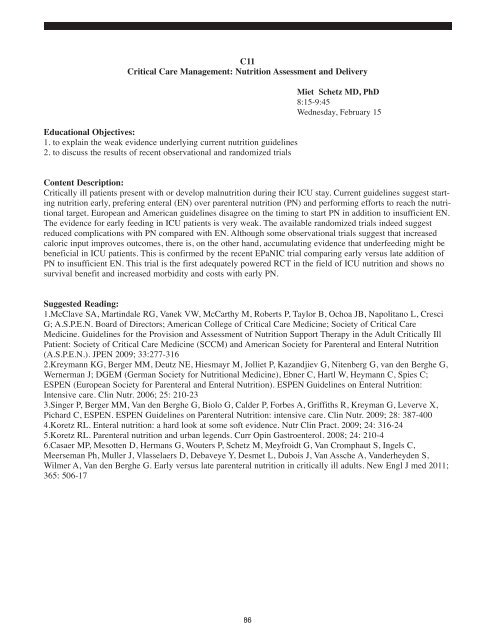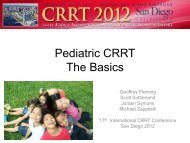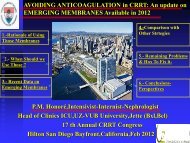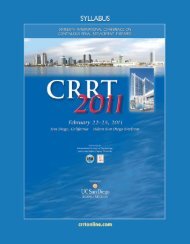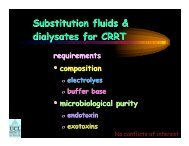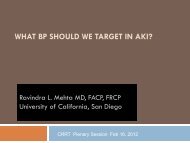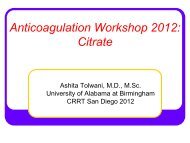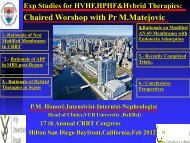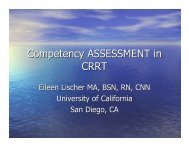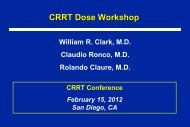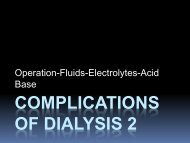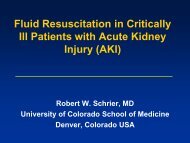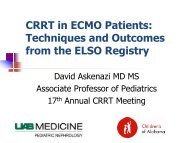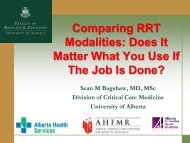ABSTRACTS from 16th International COnference on ... - CRRT Online
ABSTRACTS from 16th International COnference on ... - CRRT Online
ABSTRACTS from 16th International COnference on ... - CRRT Online
Create successful ePaper yourself
Turn your PDF publications into a flip-book with our unique Google optimized e-Paper software.
C11<br />
Critical Care Management: Nutriti<strong>on</strong> Assessment and Delivery<br />
Educati<strong>on</strong>al Objectives:<br />
1. to explain the weak evidence underlying current nutriti<strong>on</strong> guidelines<br />
2. to discuss the results of recent observati<strong>on</strong>al and randomized trials<br />
Miet Schetz MD, PhD<br />
8:15-9:45<br />
Wednesday, February 15<br />
C<strong>on</strong>tent Descripti<strong>on</strong>:<br />
Critically ill patients present with or develop malnutriti<strong>on</strong> during their ICU stay. Current guidelines suggest starting<br />
nutriti<strong>on</strong> early, prefering enteral (EN) over parenteral nutriti<strong>on</strong> (PN) and performing efforts to reach the nutriti<strong>on</strong>al<br />
target. European and American guidelines disagree <strong>on</strong> the timing to start PN in additi<strong>on</strong> to insufficient EN.<br />
The evidence for early feeding in ICU patients is very weak. The available randomized trials indeed suggest<br />
reduced complicati<strong>on</strong>s with PN compared with EN. Although some observati<strong>on</strong>al trials suggest that increased<br />
caloric input improves outcomes, there is, <strong>on</strong> the other hand, accumulating evidence that underfeeding might be<br />
beneficial in ICU patients. This is c<strong>on</strong>firmed by the recent EPaNIC trial comparing early versus late additi<strong>on</strong> of<br />
PN to insufficient EN. This trial is the first adequately powered RCT in the field of ICU nutriti<strong>on</strong> and shows no<br />
survival benefit and increased morbidity and costs with early PN.<br />
Suggested Reading:<br />
1.McClave SA, Martindale RG, Vanek VW, McCarthy M, Roberts P, Taylor B, Ochoa JB, Napolitano L, Cresci<br />
G; A.S.P.E.N. Board of Directors; American College of Critical Care Medicine; Society of Critical Care<br />
Medicine. Guidelines for the Provisi<strong>on</strong> and Assessment of Nutriti<strong>on</strong> Support Therapy in the Adult Critically Ill<br />
Patient: Society of Critical Care Medicine (SCCM) and American Society for Parenteral and Enteral Nutriti<strong>on</strong><br />
(A.S.P.E.N.). JPEN 2009; 33:277-316<br />
2.Kreymann KG, Berger MM, Deutz NE, Hiesmayr M, Jolliet P, Kazandjiev G, Nitenberg G, van den Berghe G,<br />
Wernerman J; DGEM (German Society for Nutriti<strong>on</strong>al Medicine), Ebner C, Hartl W, Heymann C, Spies C;<br />
ESPEN (European Society for Parenteral and Enteral Nutriti<strong>on</strong>). ESPEN Guidelines <strong>on</strong> Enteral Nutriti<strong>on</strong>:<br />
Intensive care. Clin Nutr. 2006; 25: 210-23<br />
3.Singer P, Berger MM, Van den Berghe G, Biolo G, Calder P, Forbes A, Griffiths R, Kreyman G, Leverve X,<br />
Pichard C, ESPEN. ESPEN Guidelines <strong>on</strong> Parenteral Nutriti<strong>on</strong>: intensive care. Clin Nutr. 2009; 28: 387-400<br />
4.Koretz RL. Enteral nutriti<strong>on</strong>: a hard look at some soft evidence. Nutr Clin Pract. 2009; 24: 316-24<br />
5.Koretz RL. Parenteral nutriti<strong>on</strong> and urban legends. Curr Opin Gastroenterol. 2008; 24: 210-4<br />
6.Casaer MP, Mesotten D, Hermans G, Wouters P, Schetz M, Meyfroidt G, Van Cromphaut S, Ingels C,<br />
Meerseman Ph, Muller J, Vlasselaers D, Debaveye Y, Desmet L, Dubois J, Van Assche A, Vanderheyden S,<br />
Wilmer A, Van den Berghe G. Early versus late parenteral nutriti<strong>on</strong> in critically ill adults. New Engl J med 2011;<br />
365: 506-17<br />
86


